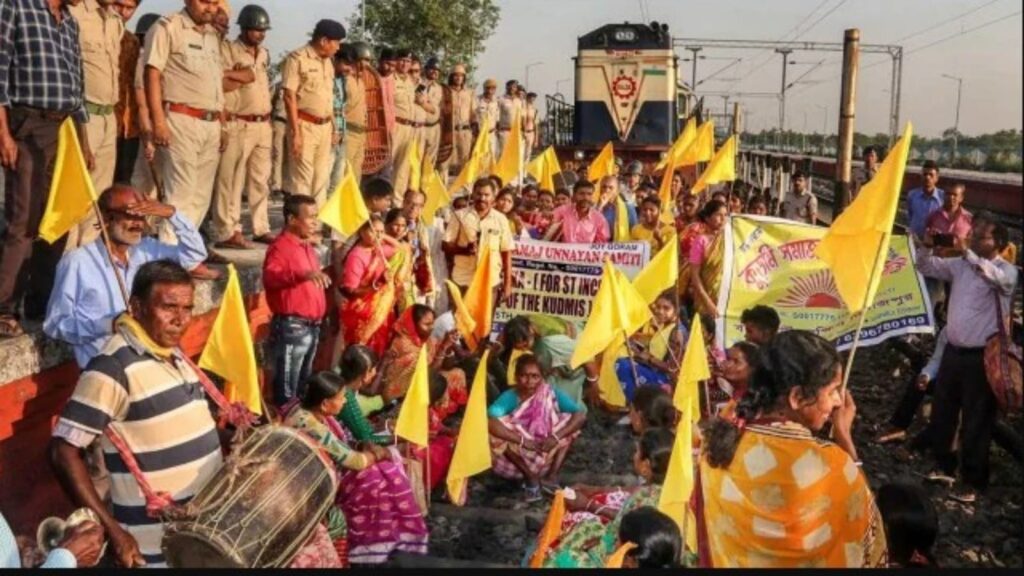For the fourth time in as many years, Kurmis in West Bengal have revived their agitation for Scheduled Tribe (ST) status, placing the Trinamool Congress (TMC) government in a spot of bother ahead of the festival season.
The Adivasi Kurmi Samaj, an umbrella organisation for the community, has called for an indefinite rail and road blockade in Jhargram, Banukra, Paschim Medinipur and Purulia districts from September 20, apart from protesting in parts of neighbouring Jharkhand and Odisha.
The protest comes even after the Calcutta High Court on September 18 declared the protest programme of the Kurmis as “illegal and unconstitutional”. However, Kurmi leaders, so far, have maintained they will hold a “peaceful” agitation. The court’s ruling had come following a petition by the Purulia Chamber of Trade and Commerce.
Adivasi Kurmi Samaj’s state youth president Parimal Mahato told The Indian Express over the phone from Bankura, “In 1931, we were categorised as STs, but we were ousted from the ST list in 1950 without a notification. We are aware of the Calcutta High Court directive. But who will we approach when the administration has turned a deaf ear? For the past six months, we have been writing to the state government, various district administrations. We announced our agitation long ago.”
“ Last year, we blocked railway stations and then, on the request of the administration, we lifted it. Later, our representatives met Chief Minister Mamata Banerjee. But nothing happened,” said the Samaj’s district youth president Kalyan Mahato.
The protest organisers claim to have the support of two Jharkhand MLAs — Jairam Kumar Mahato of the Jharkhand Loktantrik Krantikari Morcha and Dumri MLA, who is popularly known as Tiger Jairam, and All Jharkhand Students Union leader and MLA from Dumia MLA Lambodar Mahato — apart from the backing of former MP Bidyut Baran Mahato.
“We will hold a peaceful agitation tomorrow for our rights. The protests will take place in around 40 places in West Bengal, 30 places in Jharkhand, and some areas in Odisha,” said Kalyan Mahato.
The West Bengal government has placed the three districts on alert and has asked agitators to refrain from blocking roads and rail stations.
Jhargram SP Arijit Sinha and his Purulia counterpart Avijit Banerjee said the High Court order had been reiterated to the protesters and they had been warned that no blockade would be allowed on railway tracks, stations, or national highways. They urged the protest organisers to maintain peace.
Political problem for TMC
The Kurmis had organised protests in both 2022 and 2023 over their demand for ST status and inclusion of their language, Kurmali, in the Eighth Schedule of the Constitution. The protest in 2023 had paralysed movement on National Highway-6, which connects Kolkata and Mumbai, for six days in April.
Before the Lok Sabha elections last year, Kurmi-dominated villages boycotted political parties and several Kurmi leaders stood in the parliamentary seat contests. Amid widespread dissatisfaction among Kurmis, CM Mamata Banerjee met the community’s representatives on May 17, 2024, and promised to look into their demands.
With an estimated population of about 50 lakh in the state, Kurmis claim to hold sway in about 30 Assembly seats in Jhargram, Purulia, and Bankura, making them indispensable in the political calculations. The TMC leadership refused to comment on the issue even as the Opposition urged the state government to engage in dialogue with the community.
“This is happening because of the political mindset of the state government. Their agitation has been going on for years. The state government could have found a solution years ago. But it didn’t and allowed such agitations to spread,” said senior BJP leader Rahul Sinha.
CPM central committee member and former MP Sujan Chakraborty also urged the state government to hold talks with the Kurmis.
For the TMC, this is a politically tricky matter as engaging in dialogue with the Kurmis will spark protests from Adivasi communities that will oppose Kurmis getting a share of reservation benefits from their quota pie. This is why the TMC has adopted a wait-and-watch approach and is not keen on making public statements at the moment, said party insiders.
Kurmis are mainly a peasant community found in the Chota Nagpur plateau areas of West Bengal and Jharkhand, and parts of Odisha. Several members of the community also live in Assam and North Bengal, having migrated from the Chota Nagpur plateau. They were classified as STs in the 1931 Census by the British but were excluded from the list in 1950, depriving them of benefits. In 2004, the Jharkhand government recommended that the community be added to the ST list rather than be categorised as Other Backward Classes (OBCs).

